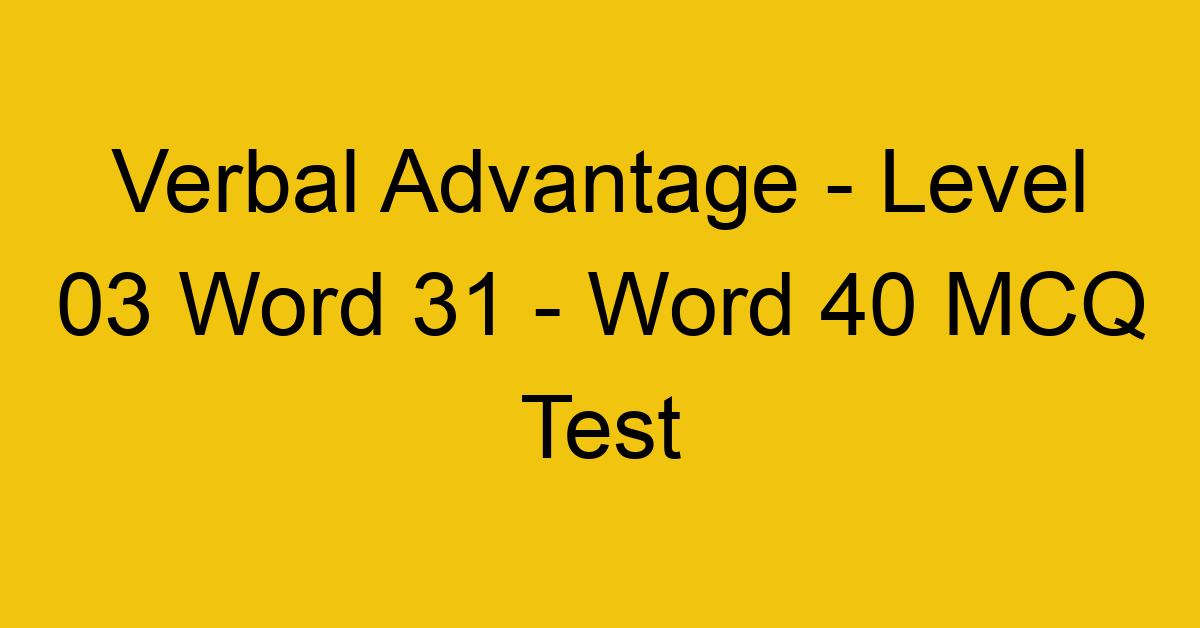Verbal Advantage - Level 03 Word 41 - Word 50 MCQ Test
Word List
- Word 41: Adroit [uh-DROYT]
Skillful, clever, dexterous; specifically, showing skill in using one’s hands or in using one’s brains.
→
Synonyms of adroit include deft, resourceful, ingenious, artful, and adept (word 7 of Level 1). Antonyms of adroit include awkward, clumsy, inept, and maladroit (MAL-uh-DROYT).
Adroit comes from Latin through the French droit, right, and means literally “to the right.” Historically, the English language has always favored the right hand as the better, more skillful hand. Yes, I know that’s unfair to southpaws, but my job is not to “say it ain’t so” but to “call ’em like I see ’em.” The fact is, a bias for right-handed words is ingrained in the language, which is one reason we don’t say “out in right field” to mean crazy, weird, unorthodox.
Let’s take a brief look at some of these “handy” English words.
The Latin dexter means on the right side, skillful. From dexter we inherit the word dexterous, skilled with the hands or body. Now, here’s where things get sinister for lefties. The Latin sinister means left, on the left side, and also wrong, evil, unfavorable, adverse, the meaning of the English word sinister today. People who are ambidextrous are equally skillful or dexterous with both hands. Can you guess what the opposite of ambidextrous is? The unusual word ambisinister means literally having two left hands, equally awkward with both hands.
Latin is not the only language that favors righties and disdains lefties. The French gauche (GOHSH) means left, but also crooked, awkward, clumsy. Gauche entered English in the eighteenth century, and since then it has been used to refer to a person who is awkward, crude, or blundering, or to behavior that lacks culture or social grace. On the other hand (so to speak), from French we have also assimilated the word adroit, done with the right hand, and therefore skillful, clever, dexterous.
Adroit may refer to physical dexterity, but it is also often used of mental ingenuity; for example, you can make an adroit maneuver in a wrestling match or in a game of chess. Adroit also often implies exhibiting either physical or mental dexterity to elude danger or extricate oneself from a difficult situation.
- Word 42: Platitude [PLAT-i-t(y)ood]
A flat, dull, ordinary remark, a trite statement or hackneyed saying, especially one uttered as if it were original or profound: “Phil thought the management seminar was a big waste of time because the instructor kept repeating the same old platitudes he had heard many times before.”
→
Platitude comes from the French word for flat, and means literally “a flat remark.” Synonyms of platitude include cliché, truism (TROO-iz-’m), and bromide (BROH-myd).
Platitude also has several useful relatives. The adjective platitudinous (PLAT-i-T(Y)OO-di-nus) refers to speech or expression that is dull, ordinary, commonplace, insipid, banal. The verb to platitudinize (PLAT-i-T(Y)OO-di-nyz) means to utter platitudes. And a platitudinarian (PLAT-i-T(Y)OO-di-NAIR-ee-in) is a person who habitually utters platitudes—flat, dull, ordinary remarks.
In Shakespeare’s Hamlet, the character Polonius is considered a platitudinarian. In bidding leave to his son Laertes, the pompous old adviser cannot resist sharing his favorite precepts, among them “Neither a borrower nor a lender be,” “To thine own self be true,” and “The apparel oft proclaims the man.” These and many other expressions from Shakespeare have since become platitudes —dull, ordinary statements uttered as if they were still meaningful and fresh.
- Word 43: Fastidious [fa-STID-ee-us]
Extremely delicate, sensitive, or particular, especially in matters of taste or behavior; dainty, fussy, finicky, overnice: fastidious table manners; a fastidious dresser; a fastidious worker who agonizes over every detail of the job.
→
Fastidious may also mean hard to please, extremely picky or demanding, exacting, critical to a fault: a fastidious ear for music; fastidious in one’s choice of friends; a fastidious client for whom a good job is never good enough.
Fastidious descends from Latin words meaning squeamish, disgusted, disdainful, and conceited. More than a trace of these unpleasant words remains in the way fastidious is used today. The fastidious person is so excessively concerned with details that he may become squeamish or disgusted if things are not just right. The fastidious person may also be so hard to please, so critical and demanding, that she appears contemptuous of others. According to the great Century Dictionary (1914), “Fastidious almost always means a somewhat proud or haughty particularity; a fastidious person is hard to please, because he objects to minute points or to some point in almost everything.”
Scrupulous, meticulous, punctilious, and fastidious all suggest demanding standards and careful attention to every aspect or detail.
Scrupulous (SKROO-pyuh-lus) means having scruples or principles; hence, rigorously careful and exact about doing what is correct and proper: “City officials called for a scrupulous investigation into the alleged embezzlement of public funds”; “All employees must follow company regulations scrupulously.”
Meticulous (muh-TIK-yuh-lus) is often used today to mean painstaking, taking pains to attend to details or exercise care, as in “The report showed meticulous research,” or “Doctors must wash their hands meticulously before examining patients.” Bear in mind, however, that meticulous comes through the Latin meticulosus, timid, from metus, fear, and by derivation properly suggests exaggerated attention to details or unimportant matters out of nervousness or timidity: “Albert dressed for the interview with meticulous care, all the while reminding himself that making a good first impression was the key to getting the job.”
Punctilious (puhngk-TIL-ee-us) comes from the Latin punctum, a point. From the same Latin punctum comes the English word punctilio (puhngk-TIL-ee-oh), a fine point, nice detail. By derivation, punctilious means exact and often excessive attention to punctilios, to fine points or minute details, especially in observing customs, ceremonies, or procedures: “The new executive director seemed to have Robert’s Rules of Order memorized, for she cited chapter and verse as she guided the board through each item on the agenda with a stern and punctilious hand.”
Fastidious means having extremely delicate, sensitive, or particular tastes; fussy, picky, or demanding in a condescending way. As Webster’s New International Dictionary, second edition (1934), puts it, fastidious suggests “a certain disdainfulness in rejecting what is displeasing to one’s taste.”
- Word 44: Vendetta [ven-DET-uh]
A bitter, protracted feud or rivalry.
→
Vendetta comes through Italian from the Latin vindicta, revenge, vengeance, the source also of the English word vindictive (word 39 of Level 5), vengeful, seeking revenge. The vindictive person feels he has been wronged and is disposed to retaliate; in certain cases this may lead to a vendetta, a long, bitter, and often violent feud.
Vendetta refers specifically to the violent tradition, formerly practiced in Italy, Sicily, and Corsica, of revenging the murder of a relative by killing the murderer or a member of his family. Of course, such private, extralegal vengeance usually leads to further retaliation, until a murderous rivalry ensues. Both in Italian and in English, these protracted blood feuds are known as vendettas. Anyone who’s seen the Godfather film trilogy knows that vendettas are still common among the American Mafia, and they can last for generations.
In English, vendetta may also be used more generally to mean any long, bitter feud or rivalry, not necessarily between families and not necessarily attended by bloodshed: “The mayor accused her opponent of waging a vendetta instead of a campaign.” “At first Steve was excited about his new managerial position with Eye-for-an-Eye Incorporated, but he soon realized that the company was run by backstabbing executives engaged in vicious departmental vendettas.”
- Word 45: Lucid [LOO-sid]
Clear, easy to see or understand, plainly expressed. Lucid is also commonly used to mean clear of mind, mentally sound, rational, sane: “His ninety-year-old mother is senile, but she still has some lucid days.”
→
Synonyms of lucid in the first sense—clear, easy to understand —include intelligible, comprehensible, limpid (LIM-pid), and perspicuous (pur-SPIK-yoo-us).
Antonyms include murky, obscure, befuddled, nebulous (word 5 of Level 2), ambiguous (word 25 of Level 2), and abstruse (abSTROOS, word 5 of Level 6), which means complicated, hard to understand.
Anything that is clearly understood or plainly expressed can be described as lucid: a lucid explanation; a lucid question; a lucid account of the issues. The unusual but useful word pellucid (puhLOO-sid) intensifies the meaning of lucid; pellucid means exceptionally clear, extremely easy to see or understand.
- Word 46: Salient [SAY-lee-int]
Conspicuous, noticeable, prominent; sticking or jutting out.
→
Synonyms of salient include protruding, manifest (MAN-i-fest), obtrusive (uhb-TROO-siv), and protuberant (proh-T(Y)OO-bur-int). Antonyms include inconspicuous, unassuming, unobtrusive, indiscernible, and unostentatious (uhn-AHS-ten-TAY-shus).
Salient comes from the Latin verb salire, to leap, jump, spring. That which is salient seems to leap out at you, jump into view, or spring forward to command your attention. People often have salient noses or other salient physical features. A salient characteristic is a person’s most conspicuous or noticeable characteristic. A salient wit is forceful and prominent.
Salient may apply to things that are attractive or unattractive. Salient beauty and salient ugliness are both striking and conspicuous; they leap out at you with equal force.
- Word 47: Categorical [KAT-uh-GOR-i-kul]
Absolute, unqualified, explicit; without exceptions, conditions, or qualifications.
→
Antonyms of categorical include ambiguous (word 25 of Level 2), and doubtful, dubious, indefinite, enigmatic, and equivocal.
In the philosophy of logic, a categorical proposition affirms something absolutely without resorting to conditions or hypothesis. In the philosophy of ethics, Immanuel Kant’s famous categorical imperative is, as the third edition of The American Heritage Dictionary puts it, “an unconditional moral law that applies to all rational beings and is independent of any personal motive or desire.”
In general usage, categorical refers to statements or assertions that are absolute, unqualified, direct and explicit. A categorical reply is direct and explicit; a categorical refusal is complete and unconditional; a categorical denial is absolute and unqualified.
Although categorical may be used of any utterance that is absolute and unqualified, today it often suggests a statement or state of mind that is rigid, narrow, arrogant, or arbitrary. A categorical decision may seem universal to some but unfair and arbitrary to others. And when someone calls a creed or opinion categorical, the implication is that some assert that it is absolute while others believe it is narrow-minded or false.
- Word 48: Inscrutable [in-SKROO-tuh-bul]
Incomprehensible, unfathomable, extremely difficult to understand, not open to investigation or analysis.
→
Synonyms of inscrutable include mysterious, impenetrable, esoteric (ES-uh-TER-ik, word 29 of Level 5), arcane (ahr-KAYN), and abstruse (word 5 of Level 6). Antonyms include comprehensible, lucid (word 45 of this level), and perspicuous (pur-SPIK-yoo-us).
Inscrutable combines the negative prefix in-, which means not, with the Latin scrutari, to examine, inspect, search thoroughly. Scrutari is also the source of the English words scrutinize, to investigate, examine closely, and scrutiny, a close examination. By derivation inscrutable means incapable of being scrutinized, not able to be examined or investigated.
Anything that cannot be fathomed, that does not open itself readily to the understanding, may be called inscrutable. Many of the workings of nature are inscrutable, even to biologists. Human nature and the functions of the mind are still inscrutable to psychiatrists and neurologists. And even to philosophers and theologians the meaning of life is still—and probably always will be—inscrutable.
Now for some advice on usage: Chances are you’ve heard inscrutable used in the phrase “an inscrutable smile.” That’s a cliché, a hackneyed expression. Unless you’re trying to be humorous, it’s best to avoid it altogether. When you use inscrutable, strive for an original turn of phrase.
And one other word of caution: In the past, perhaps because of the popularity of the fictional characters Fu Manchu and Charlie Chan, the word inscrutable was often applied to Asians or to the Asian race. You should be aware that today this use is considered not only cliché but also derogatory and offensive.
- Word 49: Construe [kun-STROO]
To interpret, explain the meaning or intention of.
→
Construe comes from the same Latin source as the familiar words construct and construction. One less common meaning of the word construction is an explanation or interpretation; in this sense, to put a construction on something—such as a statement or an action—means to assign a meaning to it, explain its significance or intent. For example, in every case decided by the United States Supreme Court, the role of the justices is to put their particular construction on how the Constitution shall influence the law of the land.
By derivation, the verb to construe means to put a particular construction on something, to interpret it, explain its underlying meaning or intention. Silence is often construed as agreement. An ambiguous reply is difficult to construe. Some men insist on construing that when a woman says no, she really means yes. If your boss asks you why you were late to work three days in a row, while you dream up an excuse you can buy time by responding, “I’m not sure how to construe your question.”
- Word 50: Allude [uh-LOOD]
To refer to something indirectly, make a casual reference.
→
Synonyms of allude include suggest, hint, insinuate, and intimate (IN-ti-mayt). Antonyms include indicate, specify, detail, and enumerate (i-N(Y)OO-mur-ayt).
To allude and to refer are synonymous but differ markedly in usage. To refer is to mention something specifically, point it out distinctly: The Declaration of Independence refers to “life, liberty, and the pursuit of happiness” as “unalienable rights.” To allude is to refer to something indirectly or casually, without mentioning it. A political candidate might allude that an opponent has a skeleton in the closet. In a report or proposal you might allude to a study that supports your point without citing it directly. Someone who is afraid of heights might allude to a disturbing childhood experience as the source of the phobia.
The corresponding noun is allusion (uh-LOO-zhun). An allusion is an indirect, casual, or passing reference: “The novel contains many allusions to Shakespeare”; “Only by allusion did the article suggest that the company was in financial trouble.”






